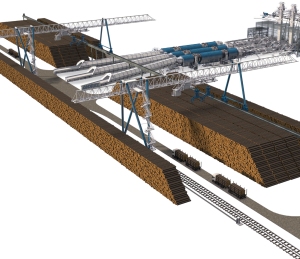
ANDRITZ to Supply Two Fully Autonomous Logyard Cranes to Metsä Fibre Included in the EPC delivery are two 2 x 25-ton cranes on a 540 meter-long runway with storage capacity of approximately 120,000 m3. Pictured above: Illustrative drawing of the ANDRITZ autonomous cranes.
Included in the EPC delivery are two 2 x 25-ton cranes on a 540 meter-long runway with storage capacity of approximately 120,000 m3. Pictured above: Illustrative drawing of the ANDRITZ autonomous cranes.
Sept. 24, 2020 - ANDRITZ and Metsä Fibre, part of the Metsä Group, have signed a preliminary agreement under which ANDRITZ will supply two fully autonomous logyard cranes to the planned Metsä Fibre bioproduct mill in Kemi, Finland. Metsä Fibre will make the EUR 1.5 billion investment decision for the new mill in autumn 2020 at the earliest, and the new mill will take approximately two and a half years to build. Included in the EPC delivery are two 2 x 25-ton cranes on a 540 meter-long runway with storage capacity of approximately 120,000 m3. The cranes will handle approximately 7,600,000 m3 wood/year shipped on trucks and trains as well as handling log storage and feeding the wood to the pulping process. These ANDRITZ cranes will be the first autonomously operated logyard cranes worldwide. They feature the latest in artificial intelligence, thus optimizing log handling, minimizing wood losses and securing environmentally friendly and cost-effective operation compared with traditional log-handling solutions. This agreement is a significant breakthrough for logyard cranes in Europe. ANDRITZ has over 50 successful references for crane installations in North America. "We valued the low noise — considering the planned mill location — the energy efficiency and all-electric drives with no fossil fuels consumed, and also the advantages created by applying advanced robotics and artificial intelligence to achieve autonomous operation," says Ismo Nousiainen, CEO of Metsä Fibre Ltd. Metsä Fibre is a leading producer of biochemicals, bioenergy and other bioproducts. Planning of the new bioproduct mill is based on a high level of environmental efficiency as well as efficiency in terms of energy and materials used. The mill will not use any fossil fuels at all, and its electricity self-sufficiency rate will be 250%. If built, the Kemi bioproduct mill will produce 1.5 million tons of softwood and hardwood pulp a year as well as many other bioproducts. ANDRITZ Pulp & Paper provides equipment, systems, complete plants and services for the production of all types of pulp, paper, board and tissue. The technologies and services focus on maximum utilization of raw materials, increased production efficiency and sustainability as well as lower overall operating costs. To learn more, visit: www.andritz.com. SOURCE: ANDRITZ |